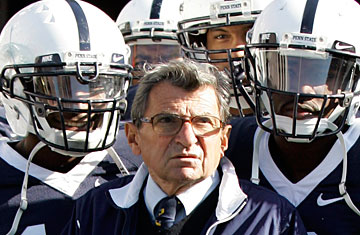
In this Oct. 13, 2007, file photo, Penn State head football coach Joe Paterno stands with his team before their NCAA game against Wisconsin in State College, Pa.
We all thought his career would end with a coronation.
Joe Paterno, who led Penn State University's football team to two national championships and five undefeated seasons in his almost 46 years as head coach, whose players bucked the college-jock stereotype and consistently earned diplomas, was supposed to leave the sidelines on his terms and be properly feted as one of the best the game has ever seen. But Paterno never got his grand send-off. Instead, just days after winning his 409th game, the most of any head coach in Divison I college-football history, the career to which he had devoted nearly his entire adult life ended under a dark, unfathomable cloud. A little more than two months after that, his life ended as well.
Paterno, who died of complications from lung-cancer treatment on Sunday, Jan. 22, at 85, was fired in November, in part because he failed to report to police the allegations of child sexual abuse against his former longtime defensive coordinator Jerry Sandusky. Paterno fulfilled his legal obligation by reporting the accusations to his immediate superiors, but Penn State's board of trustees, and much of the public, felt that a coach so celebrated for doing the right thing suffered a grave lapse in moral judgment. "I wish I had done more," Paterno admitted after his dismissal, which caused a minor riot on campus. Sandusky has been charged with more than 50 counts of child sexual abuse.
In the wake of the scandal, Paterno was removed from consideration for the Presidential Medal of Freedom. His name was scrubbed off the trophy given every year to the football champion of the Big Ten conference. "I didn't know exactly how to handle it, and I was afraid to do something that might jeopardize what the university procedure was," Paterno told the Washington Post in an interview last week, explaining his reaction to being informed in 2002 by graduate assistant coach Mike McQueary that he had witnessed Sandusky acting inappropriately with a 10-year-old boy in the Penn State showers. "So I backed away and turned it over to some other people, people I thought would have a little more expertise than I did. It didn't work out that way."
For Paterno, the Sandusky scandal was a crushing final chapter to a celebrated life, which left a lasting mark on Penn State and all of college sports. "We grieve for the loss of Joe Paterno," said Penn State president Rodney Erickson, "a great man who made us a greater university." Paterno was born in Brooklyn and studied Latin at Brooklyn Prep, a now defunct Jesuit school. He said Virgil's Aeneid, the epic poem about a courageous Trojan hero, "probably had as much influence on me as anything in my life." After an Army stint, Paterno studied English literature at Brown, where he played quarterback and cornerback. After graduating in 1950, he followed his college coach, Rip Engle, to Penn State, where he became one of Engle's assistants. Paterno promised his father that he had taken the job only to earn extra money for law school. He would stay on the Penn State sideline for the next 62 years.
Paterno was named Penn State's head coach in 1966. In his third season, the Nittany Lions went undefeated and beat Kansas in the Orange Bowl 15-14. After Penn State went undefeated for a second straight season in 1969, the Pittsburgh Steelers offered him a head coaching position. He turned them down, just as he would the New York Giants and New England Patriots later on. "So in a couple of years, maybe we'd have gone to the Super Bowl. So what?" Paterno told Sports Illustrated in 1986, when the magazine named him its Sportsman of the Year. "Here, I have an opportunity to affect the lives of a lot of young people — and not just on my football team. I'm not kidding myself that that would be true at the professional level." He went on to become the only coach to win all four of the traditional New Year's Day bowl games — the Rose, Orange, Cotton and Sugar bowls — and led Penn State to a perfect 6-0 record in Fiesta bowls.
